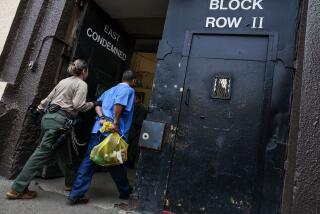Parole Panel Denies Release of San Quentin Six Murder Figure Spain
- Share via
VACAVILLE, Calif. — State parole officials on Wednesday denied a release date to Johnny L. Spain, even though prison guards had strongly supported the only man convicted of murder in the bloody 1971 San Quentin prison riot.
Panel Chairman Paul Foster said Spain had shown “exemplary adjustment” during the last six years but “needed more seasoning.”
Foster, speaking for the three-member panel of the Board of Prison Terms, said Spain was not suitable for parole because of the “savage and brutal slayings” of prison guards at San Quentin on Aug. 21, 1971.
Three guards and three inmates died in that riot. Spain and five other inmates were defendants in the so-called San Quentin Six trial in 1975, but only he was convicted. Spain was found guilty of the murder of two guards.
Foster also cited Spain’s involvement in the Black Panther Party and revolutionary politics of the late 1960s and early 1970s while he was in state prisons for a 1966 murder of a Los Angeles man. Spain since has said he no longer holds such beliefs.
Board members said they were struck by 91 letters from prison guards and other staff members praising Spain. Foster said that in cases of other inmates with life sentences, he had seen 10 or 12 laudatory letters from prison staff members.
“But 91--I was flabbergasted,” Foster said. “I have never seen that in my life.” The volume, he said, seemed to be “overkill.”
Spain’s release was opposed by the family of one of the murdered prison guards, Frank DeLeon. Shelly DeLeon, the victim’s daughter, called Spain a “cold-blooded murderer.”
Parole also was opposed by Los Angeles law enforcement agencies and the district attorney’s office that prosecuted the San Quentin Six.
Marin County Deputy Dist. Atty. Terry Boren wrote in opposition to Spain’s release but did not appear. Boren prosecuted lawyer Stephen Bingham, a former fugitive who was acquitted last month of charges that he smuggled a gun used by radical prison inmate George Jackson in an aborted escape attempt that led to the riot. Jackson was one of the inmates killed.
Spain, who did not actually shoot or stab the guards or inmates, was found guilty of conspiring with Jackson in the escape that led to the guards’ deaths.
Spain would not discuss the 1971 riot during the hearing because his lawyer, Dennis Riordan, is appealing in federal court in San Francisco.
Although the warden of San Quentin wrote to the board opposing Spain’s release, Spain received a letter from Sgt. D. C. Kitterman, a close friend of one of the slain guards, Jere Graham. Spain was convicted of that murder.
Kitterman wrote that he had hated Spain for years after the murder and probably will never forgive him for whatever role he played in the deaths, but he described a “complete and incredible change in Johnny Spain’s attitude.”
“I do feel that he would make an excellent candidate for parole,” Kitterman wrote.
“I don’t come before the board as a new person,” Spain said. “I come before the board as a person with a history . . . as I sit here today, I am . . . capable of taking on responsibility in life. There was a time when I could not do that.”
Spain said he was proud of the support he had received and said he would “not apologize for any of those letters.”
He also received letters from Oakland Mayor Lionel Wilson and Rep. Ronald V. Dellums (D-Berkeley), as well as several job offers. In prison, Spain has become an electrician and has completed high school work. He also has made the dean’s list at a junior college near the Vacaville Medical Facility where he is incarcerated.
“I can’t change history. I can only change me and I think I have done that,” Spain said, asking for a parole date.
More to Read
Sign up for Essential California
The most important California stories and recommendations in your inbox every morning.
You may occasionally receive promotional content from the Los Angeles Times.










